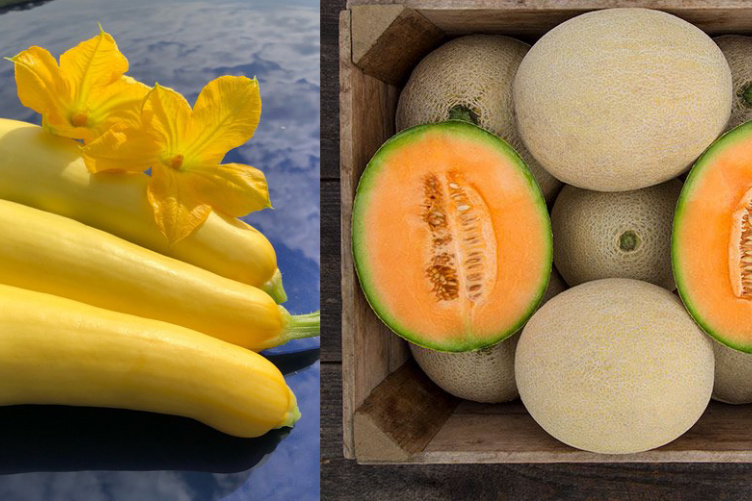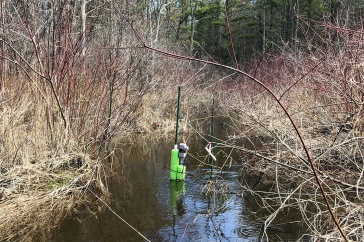
Smooth Criminal (left) and True Love are two of several new cucurbits available this year.
Gardeners preparing to plant their fruits and vegetables have several new pumpkin, squash and melon varieties to choose from this year that were developed at the NH Agricultural Experiment Station at UNH by a researcher who leads the longest, continuous squash and pumpkin breeding program in North America.
Brent Loy, emeritus professor of plant genetics, continues his ground-breaking plant breeding work as an experiment station researcher. His most recent work has resulted in the commercial release of several new cucurbit varieties. The new varieties are well suited to state and regional growing conditions, have improved marketing qualities, and exhibit intermediate resistance to powdery mildew disease.
“Development of new varieties is a key underpinning for production of abundant and nutritious vegetables. Improved variety performance in terms of yield, quality and ease of culture is paramount. Better appearance and improved nutrition and eating quality increase consumer acceptance and demand for locally produced vegetables, thereby providing more income to growers, and for regional seed companies marketing locally adapted varieties, helps maintain their profitability,” Loy said.
Three new pumpkins, a summer squash, a butternut squash and a melon have been released and are available in 2019 seed catalogues.

Johnny’s Selected Seeds has released Renegade pumpkin with powdery mildew resistance, both treated and untreated seeds. According to Johnny’s Selected Seeds, Renegade is a reliable producer in the medium to large class size with a striking, rich orange color. It is thick-walled and blocky round. Pumpkins average 14 to 18 pounds and have a strong handle and medium vine.
Rupp Seeds, which carries several UNH-developed pumpkin varieties, has released Carbonado Gold pumpkin. It is an attractive pumpkin in the 15 to 20-pound class with a sturdy and slightly smaller handle than Renegade, but with earlier maturity. As with Renegade, the handles hold up well after harvest, giving growers a higher percentage of marketable pumpkins.
Finally, Mellow Yellow is available from several seed companies. It is a unique, large yellow pumpkin filling an attractive niche for new pumpkin pigmentation. It follows in the footsteps of Owl’s Eye, a light yellow UNH release carried by High Mowing Organic Seeds. Mellow Yellow’s unique bright yellow color is striking, especially when displayed next to white pumpkins.
Seneca Vegetable Research released the fourth summer squash variety in the Slickpik® series, Smooth Criminal, and is available in several seed catalogs. Slickpik® varieties carry the gl-2 mutant for reduced spines on stems and leaf petioles, thus reducing fruit abrasions that develop into unattractive brown discolorations, well as reducing skin irritation to workers during harvest.
Hybrid Seed of New Zealand released the first butternut variety, Gabrielle, resulting from a collaborative breeding program with UNH. An F1 hybrid, Gabrielle is similar to the open pollinated variety Waltham Butternut, but with resistance to powdery mildew disease and having higher carotenoid content, giving darker flesh color and higher nutritive value to squash.
True Love melon, released by High Mowing Organic Seeds, is an eating melon with exceptionally high sugars and near-perfect texture designed to complement its sister variety, First Kiss F1. It is resistant to fusarium wilt and powdery mildew.
In addition to the new seeds, there a number of seeds available in catalogues this year that were developed by Loy, in collaboration with him, or include UNH breeding lines. They include Blonde Beauty summer squash, Smooth Operator summer squash, Butterkin winter squash, Honey Bear winter squash, Sugar Bear winter squash, Sugar Dumpling winter squash, Sugarbush acorn squash, Bagheera kabocha squash, Secretariat pumpkin, Bisbee Gold pumpkin, Skidoo Gold pumpkin, Bayhorse Gold pumpkin, Camillo pumpkin, Eros pumpkin, Naked Bear hull-less seeded pumpkin, Cider Jack pumpkin, Owl’s Eye pumpkin, Pie Pita pumpkin, Moonshine white pumpkin, Snowball white pumpkin, Blanco white pumpkin, Jason pumpkin, Carrie pumpkin, Sunlight pumpkin, Camillo Naked Seed pumpkin, Afterglow melon, Cleopatra melon, Milan melon, Shockwave melon, Ambassador melon, Sugar Cube melon, Honey Sack melon, First Kiss melon, and Marmalade tomato.

Loy’s experiment station-funded work, which has largely taken place at the experiment station’s Kingman Research Farm, Woodman Horticultural Research Farm and Macfarlane Research Greenhouses, has resulted in more than 80 new varieties of squash, pumpkins, gourds, and melons sold in seed catalogs throughout the world. Along with cucurbit breeding introduced by the late Dr. Yeager in 1940, this breeding research represents the longest continuous squash and pumpkin breeding program in North America.
According to UNHInnovation, UNH has executed 58 exclusive licenses with nine partners for inbreds and hybrids developed by Brent. Throughout his career at UNH, more than 200 hybrids and inbreds have been licensed or utilized in trial and germplasm agreements. Royalties generated by this portfolio continue to increase each year, including an expected 10 percent increase from last year. Royalties have generated more than $2 million since commercialization began of these varieties.
“Dr. Loy’s breeding work has been an excellent source of new varieties for High Mowing because of his intense focus on eating quality. He is especially unique in this regard when it comes to winter squash; he tests for sugars and dry matter every year and in every line, which has resulted in the release of some of the best-fleshed varieties on the market today. We are proud to be the exclusive vendors of a number of his releases, and we value our ongoing relationship with his program,” said Dr. Jodi Lew-Smith, leading member of High Mowing’s product development team and the head of the breeding program.
“Working with Dr. Brent Loy has been a huge help to me in the early stages of my professional plant breeding career at Johnny’s. Brent is an extremely talented breeder with great attention to detail and a deep understanding of squash and pumpkin genetics. Each year, he generously hosts us for a tour of his research plots, and I’m fascinated by all of his projects and always learn a great deal. Brent’s breeding work has also strengthened the squash and pumpkin breeding program at Johnny’s for many years, providing many high-quality parent lines of diverse types of squash and pumpkins for us to use in our breeding work. We’ve also been proud to release varieties developed at UNH, such as our recently released Renegade pumpkin and our Honey Bear acorn squash. We are very appreciative of Brent’s many contributions to the squash and pumpkin community,” Lindsay Wyatt, squash and pumpkin breeder at Johnny’s Selected Seeds.
This material is based upon work supported by the NH Agricultural Experiment Station, through joint funding of the National Institute of Food and Agriculture, U.S. Department of Agriculture, under award number 1016574, and the state of New Hampshire.
Founded in 1887, the NH Agricultural Experiment Stationat theUNH College of Life Sciences and Agriculture ;is UNH’s original research center and an elemental component of New Hampshire's land-grant university heritage and mission. We steward federal and state funding, including support from the USDA National Institute of Food and Agriculture, to provide unbiased and objective research concerning diverse aspects of sustainable agriculture and foods, aquaculture, forest management, and related wildlife, natural resources and rural community topics. We maintain the Woodman and Kingman agronomy and horticultural research farms, the Macfarlane Research Greenhouses, the Fairchild Dairy Teaching and Research Center, and the Organic Dairy Research Farm. Additional properties also provide forage, forests and woodlands in direct support to research, teaching, and outreach.
-
Written By:
Lori Tyler Gula, PhD | NH Agricultural Experiment Station | lori.gula@unh.edu | 603-862-1452
















































